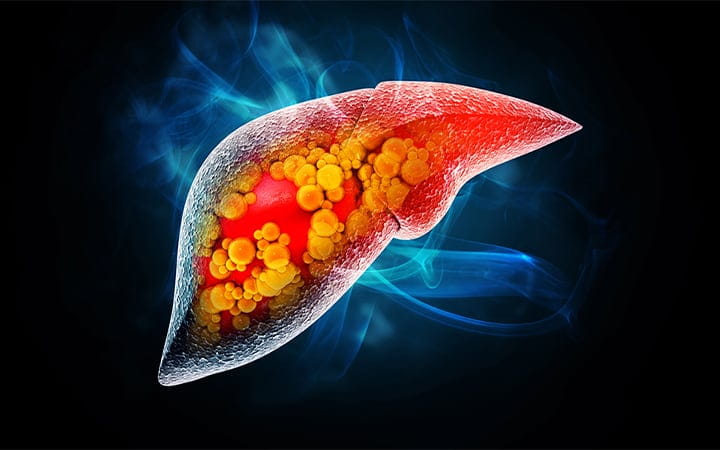New Developments in Treating Fatty Liver Disease
August 27, 2025

The liver is the largest organ in the body, with many important jobs like filtering dangerous chemicals from the blood, breaking down food and producing proteins to keep the body in good repair.
A healthy liver normally contains a small amount of fat. When too much fat accumulates, a condition called steatotic liver disease develops, previously known as fatty liver disease. Left unmanaged, it can lead to cirrhosis, liver failure, liver cancer and the need for a liver transplant.
“Now is an exciting time for the treatment of steatotic liver disease,” says Seth Sclair, MD, a hepatologist with University Hospitals Digestive Health Institute. “We have several drugs that can significantly slow or even halt liver disease in some patients.”
New Treatments
The most common type of liver disease is a type of steatotic liver disease called metabolic dysfunction-associated steatotic liver disease (MASLD). If left unmanaged, MASLD can turn into metabolic dysfunction–associated steatohepatitis (MASH).
Resmetirom: Working Directly on the Liver
Sold as Rezdiffra, resmetirom is approved to treat liver disease that hasn’t caused cirrhosis, which occurs when the liver shrinks and is permanently scarred. Resmetirom works directly on the liver to improve metabolism, increase fat “burning” and reduce inflammation.
Side effects of the drug are usually mild and manageable. In clinical studies, about one in four patients saw significant improvement in scarring, fat accumulation and inflammation in the liver.
New Use for Semaglutide
Recent research has shown that the popular GLP-1 weight loss drug, semaglutide, may halt and even reverse severe liver disease in some patients. The drug lowers blood sugar levels, regulates insulin and limits appetite by slowing stomach emptying.
“Unlike resmetirom, which works directly on the liver, semaglutide has a broader effect on the body, as a result of its effectiveness in treating type 2 diabetes and obesity,” Dr. Sclair says.
For many people, liver disease is driven by obesity or type 2 diabetes. Research shows that treating obesity and improving blood sugar levels with semaglutide can reduce fat, inflammation and scarring in the liver.
Semaglutide is sold under the Wegovy, Ozempic and Rybelsus brand names. In August 2025, the FDA approved using Wegovy semaglutide injections to treat MASH in adults who have moderate-to-advanced liver scarring.
Future Treatments
Dr. Sclair expects more treatments to be developed and approved over the next few years, further expanding treatment options for patients. He and his colleagues continue to participate in clinical trials aimed at improving the care and outcomes of patients with liver disease.
Related Links:
University Hospitals has a vast network of primary care providers with the training and experience to prevent, diagnose and treat a wide variety of diseases and disorders, including steatotic liver disease.


